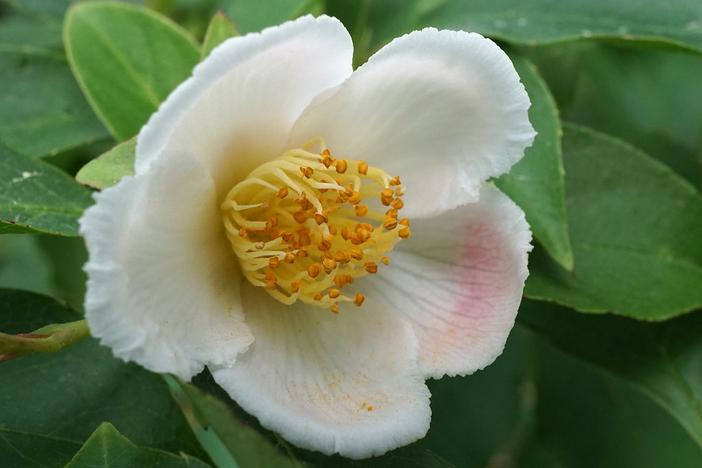Beaked Stewartia
(Stewartia rostrata)
Beaked Stewartia (Stewartia rostrata)
/
/

Plant Image Library
CC BY-SA 2.0
Image By:
Plant Image Library
Recorded By:
Copyright:
CC BY-SA 2.0
Copyright Notice:
Photo by: Plant Image Library | License Type: CC BY-SA 2.0 | License URL: https://creativecommons.org/licenses/by-sa/2.0/ | Uploader: Plant Image Library | Publisher: Flickr















Estimated Native Range
Summary
Stewartia rostrata, commonly known as Beaked Stewartia, is a deciduous small tree or large shrub native to the forest margins and open woodlands of southeastern China. It typically grows to a height of up to 20 feet tall and is noted for its multi-season interest. The Beaked Stewartia exhibits a striking appearance with exfoliating bark that reveals a tapestry of colors including tan, brown, and gray, which is particularly notable in the winter landscape. Its white, camellia-like flowers with red spots at the base of the petals bloom in late spring to early summer and are quite showy, attracting pollinators and garden admirers alike.
This species is valued for its ornamental bark and beautiful flowers, which make it an excellent choice for smaller gardens and woodland settings. It is also used as a specimen plant or in mixed borders. Stewartia rostrata prefers acidic to neutral, well-drained soils and can tolerate partial shade to full sun, though it benefits from some protection from the hottest afternoon sun. It requires consistent moisture and should not be allowed to dry out. While it is generally low maintenance, it can be susceptible to leaf spot diseases and should be monitored for signs of infection. It is not known for aggressive roots or significant pest problems. Gardeners should be aware that it may take several years to establish and begin flowering.CC BY-SA 4.0
This species is valued for its ornamental bark and beautiful flowers, which make it an excellent choice for smaller gardens and woodland settings. It is also used as a specimen plant or in mixed borders. Stewartia rostrata prefers acidic to neutral, well-drained soils and can tolerate partial shade to full sun, though it benefits from some protection from the hottest afternoon sun. It requires consistent moisture and should not be allowed to dry out. While it is generally low maintenance, it can be susceptible to leaf spot diseases and should be monitored for signs of infection. It is not known for aggressive roots or significant pest problems. Gardeners should be aware that it may take several years to establish and begin flowering.CC BY-SA 4.0
Plant Description
- Plant Type: Shrub, Tree
- Height: 13-33 feet
- Width: 8-13 feet
- Growth Rate: Moderate, Slow
- Flower Color: White, Yellow
- Flowering Season: Spring, Summer
- Leaf Retention: Deciduous
Growth Requirements
- Sun: Full Sun, Part Shade
- Water: Medium
- Drainage: Medium
Common Uses
Bird Garden, Border Plant, Low Maintenance, Potted Plant, Showy Flowers
Natural Habitat
Forest margins and open woodlands of southeastern China
Other Names
Common Names: Upright Stewartia , Chang Hui Zi Jing
Scientific Names: Stewartia rostrata , Stewartia glabra , Stewartia sinensis var. rostrata
GBIF Accepted Name: